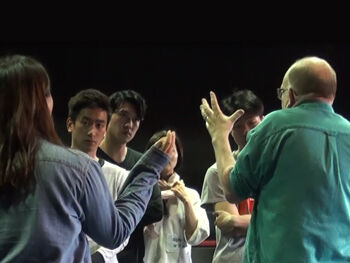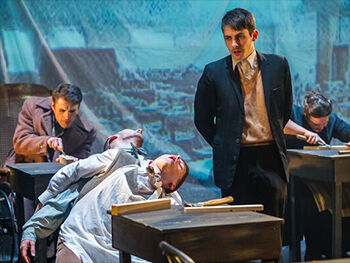News and events
The Research Whisperer blog
The Research Whisperer is dedicated to the topic of doing research in academia. We talk about finding funding, research culture, and building academic track-records.This blog is managed by Jonathan O'Donnell and Tseen Khoo.
The Seoul Project
 Peter Wynne-Willson, Course Director for Applied Performance visited South Korea in April to establish links with universities and theatre companies in Seoul.
Peter Wynne-Willson, Course Director for Applied Performance visited South Korea in April to establish links with universities and theatre companies in Seoul.
Peter said: "It was an exciting and fruitful 10 days, in a forward-thinking country which is keen to strengthen its links with the UK’s academic and artistic communities, and it seems likely to lead to some valuable collaborative projects and lasting partnerships."
Theatre collaboration with Budapest conservator for theatre and film
 Birmingham School of Acting have teamed up with Kolectiv Theatre for a multimedia performance based on Bruno Schulz novel Street of Crocodiles at the University of Theatre and Film Arts in Budapest, Hungary in May.
Birmingham School of Acting have teamed up with Kolectiv Theatre for a multimedia performance based on Bruno Schulz novel Street of Crocodiles at the University of Theatre and Film Arts in Budapest, Hungary in May.
This is the beginning of collaborative practice as research project between BSA and a leading Conservatoire in Central Europe. The performance was directed by Aleksnadar Dundjerovic, movement director was Clive Mendus ( Complicite) and original music was composed by Chloe Knibbs.
Conference: Terrorism and Cultural Freedom
Join us on Tuesday 7 June for an intensive one-day discussion of the most critical political issue now facing the world and the future of culture within it.
This is the first in a series of annual international one-day conferences organized by Professor Jonathan Harris, Head of School of Arts within the Centre for Fine Arts Research (CFAR) on topics of urgent social interest locally, nationally and globally. 'Terrorism and Cultural Freedom' assembles a group of world-leading intellectuals, commentators and cultural figures to discuss the most pressing political and artistic concerns of the world today.
Though terrorism is associated currently with fundamentalism originating in the Middle East (and with the response of western nation-states to it) forms of violent action against states, countries, cultures, groups and individuals has a long history.
Keynote speakers WJT Mitchell, Tariq Ali and Anthony Downey will contribute incisive accounts of the stakes in this crisis, examining both ‘terror’ as an idea and its complex relations to a range of cultural and artistic practices, both historical and contemporary. In addition to contributions by these speakers, the conference will include shorter presentations concerned with cultural freedom in an age of global terrorism, related to music, art, fashion, media, the moving image, writing and theatre drawn from experts within Birmingham City University’s own arts, design and media research communities, and including historical and contemporary examples.
AHRC Innovation Award project: Conflict, Memory, and Displacement
Conflict, Memory, Displacement project is funded by an AHRC Innovation Award and is responding to refugee crisis in the UK and Italy. It is a project that will explore how people make sense of international conflict and how this understanding shapes attitudes to those displaced by conflict.
Led by Kirsten Forkert in the School of Media, the interdisciplinary research team includes Gargi Bhattacharyya (University of East London), Federico Oliveri (University of Pisa) and Janna Graham (Nottingham Contemporary).
The project will examine the representation of conflict and of the impact of conflict through media representations, official and popular discourses, and institutional and citizen initiatives. It will also look at the ways refugees remember and memorialise the situations they have left behind. How can us help us understand the refugee crisis, and more generally international conflicts?